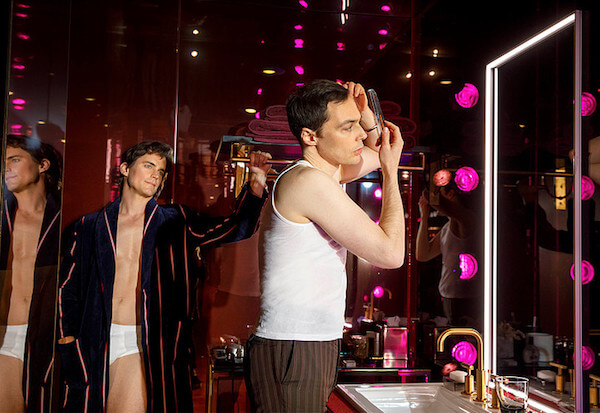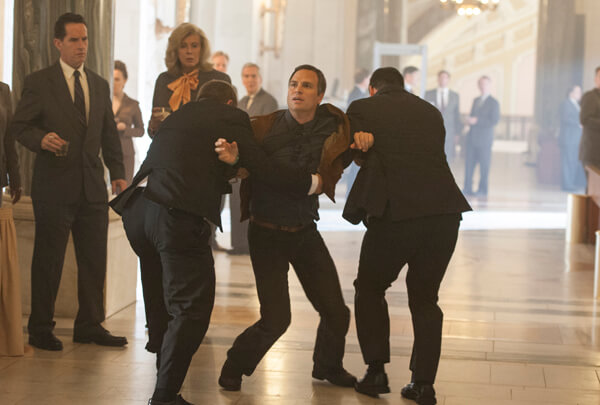Jenn Colella and the cast of Irene Sankoff and David Hein’s “Come From Away,” now at the Gerald Schoenfeld Theatre. | MATTHEW MURPHY
For all of us despairing about the indifference, blatant self-serving, and divisive hatred that define the current political regime, there is a welcome balm on the New York stage today in the form of the musical “Come From Away.” This show will make you feel good, if not euphoric, but it achieves that end not by being escapist entertainment but that by reminding us that there is goodness in people, that the desire to provide help and comfort in a times of crisis can transcend superficial differences between people. Most wonderfully, the show does this in a lighthearted, celebratory mode, made all the more moving because it’s based on a true story.
Planes in the air on 9/11 in the hours after the attacks in New York and Washington were not allowed to land in US airports, and so for nearly 40 aircraft and approximately 7,000 passengers, this meant being diverted to the airport at Gander, Newfoundland. Built largely as a refueling stop decades earlier, the advent of long haul carriers meant that Gander and its large airport were largely forgotten. This small town insulated from the world was thrown into chaos as it nearly doubled in size with the people from all over the world who, in local parlance, came from away. How the town responded by embracing the strangers and helping to ease their pain and disorientation is what makes up the plot.
With book, music, and lyrics by Irene Sankoff and David Hein, the show interweaves the stories of the people – and animals – displaced and scared by events with those of the town folk. The company’s 12 actors play multiple roles, adroitly juxtaposing individual stories against the larger issues of how a crisis of this magnitude is managed. In the end, the townspeople welcome the visitors into their homes and lives, regardless of whether they are gay, Muslim, or can’t speak English. Relationships are formed and some are broken, with humor and tragedy existing side-by-side. Sankoff and Hein have an uncanny ability to balance complex and disquieting emotions with comedy and also an evident belief in the power of the human spirit to overcome prejudices and fears.
Brilliant new musical, disappointing classic, and play that goes “meh”
The score is a synthesis of styles — Celtic, folk, country — that consistently works. The lyrics are inspired, cleverly capturing the way real people would talk and so achieving a level of everyday poetry that beautifully reveals characters.
The company is uniformly excellent. They work together as a flawless ensemble. In particular, Chad Kimball as one half of a gay couple and as a townsperson imbues both roles with heart and depth. Jenn Colella as an American Airlines pilot is a standout. I’ve long been a fan of hers, and her rendition of “Me and the Sky,” about how the thing she loves most, flying airplanes, has been irrevocably changed, soars. Under Christopher Ashley’s direction, the fast-paced story is masterfully told, making brilliant use of even the smallest details, clearly delineating each character, and leaving no heart untouched.
If the current political climate is causing you anxiety, you must see this show to be reminded that not everyone is as selfishly misanthropic as our current president. I just might need to go once a week for the next four years.
Far from being illuminating, Sam Gold’s deconstruction of “The Glass Menagerie” is a full-on assault on Tennessee Williams’ iconic play, an intellectual exercise that results in an incoherent and tedious evening. Coming so closely on the heels of Gold’s brilliant work in “Othello” for New York Theatre Workshop and “Fun Home,” Gold can be credited for being a visionary risk-taker, though here the risk doesn’t pay off.
Finn Wittrock and Madison Ferris, with Sally Field in the background, in Tennessee Williams’ “The Glass Menagerie,” directed by Sam Gold, at the Belasco Theatre. | JULIETA CERVANTES
“The Glass Menagerie,” is arguably one of Williams’ most lyrical plays. Constructed as a memory, the language has an inherent poetry as fragile as the eponymous collection of figurines. Tom, the narrator and a character in the play, tells the story of his life with his mother Amanda and his disabled sister Laura in a St. Louis tenement in the 1930s, though you wouldn’t know that from the virtually bare stage “designed” by Andrew Lieberman. The pivotal event of the play is the arrival of a Gentleman Caller, ostensibly to court Laura. Juxtaposed against Amanda’s unreal memories of her belle-of-the-ball Southern youth and her desperation for Laura is Tom’s desire to escape the suffocating home environment and his dead end job in a shoe warehouse as he dreams of being a writer.
In working against the language, Gold and Joe Mantello as Tom create a vision of the character as one suffused with unresolved anger. Time has not softened his rage. It works directly against the script in which Tom says, “I give you truth in the pleasant disguise of illusion.” There is nothing remotely pleasant about this interpretation of the character. It’s as if Gold respects neither the play nor the audience and needs to hit us over the head with Tom’s failure as a writer, brother, and son. Rather than draw us in to Tom’s tragedy, Mantello stays at a cool distance that leaves the audience cold.
Worse yet is the interpretation of Amanda. Yes, Williams famously thought his mother was a monster, but as written the play seeks to find some compassion for Amanda. That is gone in this production. Sally Field in the role gives an erratic performance that fluctuates between rage and flirtation. Whereas Cherry Jones, in the most recent Broadway production, found every nuance in the character and made Amanda heartbreaking, Field gives Amanda no plausible foundation. Her performance is a series of eruptions rather than a coherent whole.
In casting Madison Ferris, an actress with muscular dystrophy, as Laura, Gold doesn’t serve the actress or the play. To be sure Ferris is brilliant in her scene with The Gentleman Caller, but Laura’s disability is largely in her own mind, as written by Williams. Making it so literal changes the dynamic of the play. It renders Amanda as more monstrous in her denial and Tom more selfish in his abandonment of the family. They become cruel rather than lost and undermine the play.
Only Finn Wittrock as The Gentleman Caller seems to be in the play Williams wrote. Tom describes him as “an emissary from the real world that we were somehow set apart from.” Wittrock is charming, self-conscious, and endearingly clumsy as the high school star – on whom Laura had a crush – who hasn’t fulfilled his promise. Perhaps it’s fitting that he should seem like he’s from a different play.
Casting Field is certainly one way to sell tickets. She’s an accomplished actor that people should normally flock to see. Here, however, she seems stuck in an academic experiment more fitting in an undergraduate theater program than a Broadway stage. When the production concept is so at odds with the play, one can respect the effort but regret its failure.
JOAN MARCUSJanie Dee in Penelope Skinner’s “Linda,” directed by Lynne Meadow, at New York City Center through April 2. | JOAN MARCUS
Don’t let the overstuffed plotting fool you. “Linda” is a relatively superficial play about a 55-year-old woman’s struggle to “have it all.” It is largely a collection of tropes and triggers about what success means for women and the price they have to pay for that.
Linda is a successful executive whose daughter is a mess and husband is unfaithful. At her age, she’s at risk of being marginalized at work. Angst ensues. Playwright Penelope Skinner merely skims the surface of all of these issues, relying on the audience to fill in the emotional gaps that are indicated rather than explored. This is lazy playwriting, and though the play has its charms and is often diverting, it’s ultimately shallow and unsatisfying.
The piece is partially redeemed by the fine performance of Janie Dee in the title role. She is convincing if not overly complex in her performance. Lynne Meadow’s direction is workmanlike and mechanical, as is the incessantly rotating set by Walt Spangler.
Having it all, as the play makes abundantly clear, isn’t really possible. One only wishes we had a little more in terms of a play.
COME FROM AWAY | Gerald Schoenfeld Theatre, 236 W. 45th St. | Tue., Thu. at 7 p.m.; Wed., Fri.-Sat. at 8 p.m.; Wed., Sat. at 2 p.m.; Sun. at 3 p.m. | $47-$167; telecharge.com or 212-239-6200 | One hr., 40 mins., no intermission
THE GLASS MENAGERIE | Belasco Theatre, 111 W. 44th St. | Tue., Thu. at 7 p.m.; Wed., Fri.-Sat. at 8 p.m. : Wed., Sat. at 2 p.m.; Sun. at 3 p.m. | $35-$149; telecharge.com or 212-239-6200
LINDA | New York City Center, 131 W. 55th St. | Through Apr. 2: Tue.-Wed. at 7 p.m.; Thu.-Sat. at 8 p.m.; Wed., Sat.-Sun. at 2 p.m. | nycitycenter.org or 212-581-1212 | Two hrs., 15 mins., with intermission





































